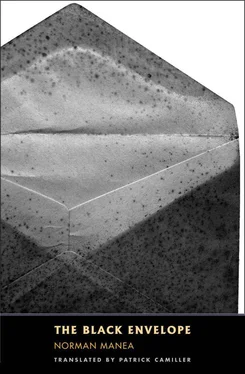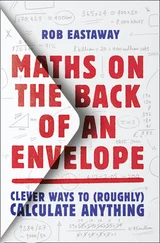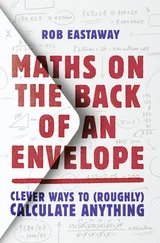“Are you reading? What is it? Ah, that paper. The business with the old woman, the cats, the fire. Does it interest you? Does it really? We were supposed to see each other — perhaps you remember. I have taken the liberty of, well, just a few minutes. I wouldn’t want to intrude on your time — I promise.”
The professore did not know whether it was in his own voice that he answered.
“It’s Ianuli again, is it? It’s him you want to ask me about? Well, I don’t know him. Yes, I know he’s friendly with Irina. Yes, yes, Irina Radovici. No, not in the sense that … No, just a friend, I know. I’ve heard of him, so have lots of people. But I don’t know him personally. All I can say are the banal things everyone knows. Everyone knows the Ianuli legend.”
Mr. Vancea fidgeted around looking for his cigarettes, but he could not find them. The room was floating in a gray mist; he could not even find suitable words to speak.
“A withdrawn type, not the same as he used to be. That’s what people say.”
“Very withdrawn, I’ve heard. And ill, very ill — so they say. He’s grown old and sick, and he’s got a family, all kinds of worries …”
“Yes, the family. Do you know the missus?”
“No, not in the slightest” came the hurried reply.
“Absolutely not at all?”
“I’ve just seen her a few times in the street. We’ve never spoken to each other.”
“Sure, sure. They’ve got a boy as well, haven’t they? I mean a young man, a student already.”
“He’s not Ianuli’s. He’s her son from a previous marriage. Not exactly a marriage, but it’s not important — anyway, from a relationship.”
“We know: it’s not important. So in your view this hero is washed up? Is that what you think?”
“I don’t think anything: I don’t know him. And anyway, you know him better than I do. He’s your typical hero. A revolutionary! You must know him better. He embodies — no? — symbolizes …”
“So now we’re getting there. You’ve put your finger on a very sore spot, I can tell you. Does someone like that remain fascinating? Do you think so, eh? But there’s a danger as well, you know. It’s not your street-corner discontents but these big-time ones who pose a threat, I can tell you. They’re past treatment! Heroes of the struggle, sure— good for spectacular upheavals. But what then? They need to understand reality, the world of the concrete — which is always relative. Prophets driven by ideals become, become — you know what I mean. It no longer counts whose side they were on or would like to be on, I can tell you. Where is the devil? In those obstinate monks whose eyes are fixed on an obsession? Or in their opposite: the adaptable crowd, the apathetic jokers?”
“I wouldn’t know. I’m not a theologian or a psychologist or an ideologue. I’m a cripple, the most crippled of all, my dear patrolman. Just let me sleep — sleep and be quiet.”
“Is Comrade Ianuli also substituting for someone? Is it myth, illusion, utopia? Or mystery, conspiracy? Or what the hell is the Ianuli legend substituting for? How can it still be peddled today, in a world where everyone is numb? Does it fetch a good price? Is there still a demand for it?”
“I don’t understand. I don’t understand what you want.”
“The believers, the rigid, maladjusted ones — are they the real danger, or the crowd of gawkers?”
“A danger for whom?”
“You keep avoiding a reply. You understand me only too well, I know. You understand only too well what we’re interested in, why we want to know your opinion. Could Ianuli ever become the same as before? I mean, could he move to the other side of the barricades? All those firebrands, schizoids are the same, in fact, I can tell you. All frustrated! That’s the criterion that could be used to pick them out. Frustrated, schizoid. Thirsting for power! They’re given pretty names from lullabies. But let’s look at it from a different angle. What about yourself? Is there an idealist inside you? A rebel, a true believer? Would you enlist for the struggle, shall we say?”
“I haven’t got enough qualities, or enough — defects. I’m contemplative and sedentary and set in my ways and, and — Well, I simply wouldn’t covet the honor which—”
“But are you the opposite? Untouched by anything? The slippery one who whistles and hops about?”
“Absolutely not. I’m not sufficiently—”
“Well, you were saying that in everyone there’s a bit of everything. That people are different, often opposite, and that’s how it should be — but everyone has other individuals inside him, potentially. That would mean, I suppose, that in a certain situation he might become, if only for a short period, he might become—”
“Huh, I haven’t said that yet. I never said anything like it — so don’t go around saying I did. Who taught you that stuff, eh?”
He was on the point of shouting, but his voice had cut out some time before. The questions had also stopped: the silence had grown longer and longer, turning into weariness. He waited for the torture to begin again, but the pause continued: the silence became lassitude, drowsiness. He should have switched on the light, but he didn’t have the strength.
Dawn found him exhausted. The directions for a meeting — is that what I’m looking for? How will they, will I, meet death? Who will be the one singled out? How does the road lie ahead toward the future, that is, toward death? We don’t have any immortals or any posterity. An age without immortals and without posterity? How do the past, our parents, the premise meet up again? That is, the future; that is, death. He kept muttering without a break, as if he had become senile. And he was pale, old, wasted by insomnia.
A puffed-up fool, that’s all there is to him. A substitute in a world of substitutes. But a crackpot who lashes out and hits the glasses by mistake can also, presumably, knock the alarm circuits. That’s what our Tolea is good for. Stupid pranks may give rise to unintentional difficulties, defections, revelations; the clown may revive things sleeping in the depths. We push him into the teeming shadows, till he starts thrashing around and screaming, like the loony blighter he is. Bubbles eddies sparks. Perhaps movement will be triggered by mistake. The shock to set the engine going, that is what he has been imploring for so long.
On the morning when the plot finally began, he looked younger than the age supposedly required by the action. The ex-teacher Tolea Voinov, self-selected as the bait, the trigger, the muddlehead, still looked youthful. Young Anatol, dressed to match the young and alert season.
The challenge, professore , the challenge! Proof that there’s still a chance for the powerless, even when everything appears crushed. I’ll prove it, I swear I will! I’ll put up a tiny obstacle, a teeny-weeny poisoned obstacle. Maybe I’ll hit the center of the Monster. Maybe I’ll blind the Jabberer, the Cyclops. Maybe I’ll poison Goliath with my little flower. He had raised his empty glass as if to offer a toast. His cigarette was burning his fingers. But he had still collapsed again— stupefied, exhausted. The shadows of the room and his thoughts and the hours had once more become entangled; dusk had again arrived. He would have liked to stretch out on the sofa for a few moments, but no, it’s no good on the sofa, he’d find Toma the spy there, uninvited. Better like this, on my feet, at the night-darkened window. Or on the chair, perhaps there. You can grip it firmly, tighten your belt, push hard against the back of the chair so that you can no longer be dragged up. Yes, it’s good like that: he had closed opened his eyes. It grew darker and darker: he shut his eyes and the setting suddenly lit up in the solemn and sumptuous courtroom. The Council for Model Culture and Disabled Education. The Committee for Neurotic Refugees.
Читать дальше












